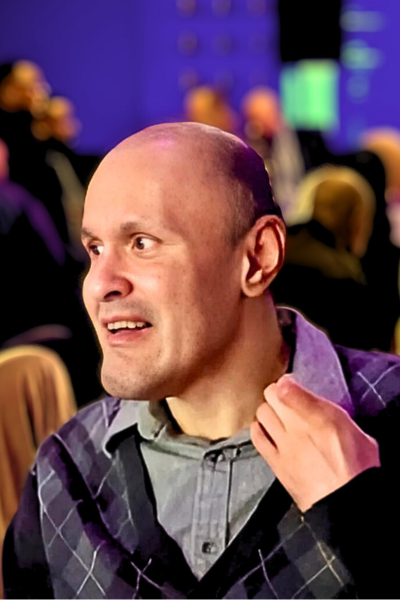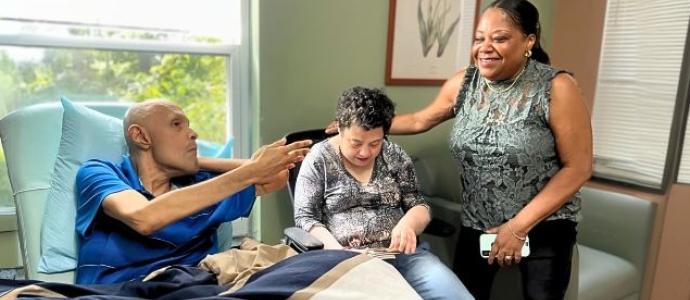Share
Carlos Armando Rojas loves to laugh, be tickled under his chin, and eat delicious food. He has an insatiable appetite for all kinds of dishes – pasta, stews, and arroz con pollo, to name a few. But his favorite dish that always makes his face light up, even on the hardest days, is chicken noodle soup, specially made by Rita Poliard, a direct support professional (DSP) at his home. On good days, with a foley bag attached to him and help from staff, he finds joy in the simple things like venturing out of his YAI Queens residence, down 27 steps, to explore his quaint neighborhood.
On better days, music is his therapy. On a recent afternoon, Poliard played a Julio Iglesias song for Rojas. She danced while tickling his feet. Rojas, 54, wiggled his toes in response as he lay upright in his bed, smiling. Suddenly, a tear trickled down his cheek.
“It’s ok Mandito, you have us,” Poliard said comforting him. “Everyone has to go through it, we are here for you, whatever you need, I am not going anywhere.”
Rojas, who is nonverbal and on the autism spectrum is receiving hospice care at his home after being diagnosed with acute renal failure in June. He grew up an only child in a Peruvian family until his mother moved him into the home more than 25 years ago. He has lived there with nine other residents since before it became a YAI residence in 1999. Poliard has been a DSP at the home for the last 14 years.
“Believe me when I say this, it’s an absolute privilege for me to take care of Armando,” she said. “When I am with him, I try to do everything I didn’t have a chance to do for my own family members in Haiti who all passed away in their fifties.”

Earlier this summer, after learning about his terminal condition and declining health, the staff at Rojas’ residence decided to bring him home while he receives hospice care.
“When we learned he didn’t need more than what we could provide for him here, we said he should be home with his family and friends because we are the ones who hold his story,” said Bryan Dempsey, Assistant Program Director of the residence where Rojas lives. “We wanted to be the people who took care of him as long as we can. As difficult as it will be for us, this is where he belongs.”
It’s the first time Dempsey and his staff are caring for an actively dying resident at the home. Only 9-18 percent of people with intellectual and developmental disabilities (I/DD) used hospice or palliative care, compared to 38 percent of the general population according to the Center to Advance Palliative Care.
Providing end-of-life care for this vulnerable population is challenging. Residential providers often lack knowledge about preparing for the inevitable, and there is no state-mandated guidance on how to navigate loss in programs. Communication difficulties and cost concerns related to reimbursement, staffing, and training also pose obstacles.
Despite the lack of state-funded resources, YAI offers a variety of trauma, grief, and loss-related trainings both internally and externally. The 15 staff members at Rojas’ residence recently took a one-day grief and bereavement workshop through YAI Knowledge, the organization’s training department. They learned practical tools to manage their own emotions while continuing to provide the best possible care to Rojas. The training covered what to expect from the act of dying process, to what to expect Rojas to go through, and how to prepare for the stages of death.
“Most importantly it taught us what to expect from our own emotions and what to look for in our peers...reminding us it is ok to ask for help and step away if we are having a hard time,” Dempsey added.
The new challenge has not only brought the team closer together but has seen staff, especially those who feared they couldn’t handle the situation, step up and shine.
“The therapeutic touch for Armando has been amazing...none of this would be possible in a nursing home, rehab center, or hospital, he would have been gone already,” said Dempsey. “The people from hospice are shocked when they come...they tell us, ‘Don’t expect him to be here past the weekend,’...that was six weeks ago.”
The unexpected additional time is a miraculous win that the staff isn't taking for granted.
“Every day with Armando reinforces for us that this is a gift we have been given,” said Dempsey. “In our own life we can talk about our graduations, communions, etc., but not all the people we support can tell you about their milestones and this is one of them, and one we will be honored to be part of when that day comes.”
Editor’s note: Rojas passed away peacefully in his residence surrounded by his peers and staff who have cared for him for nearly 30 years on Monday, September 23, 2024.

